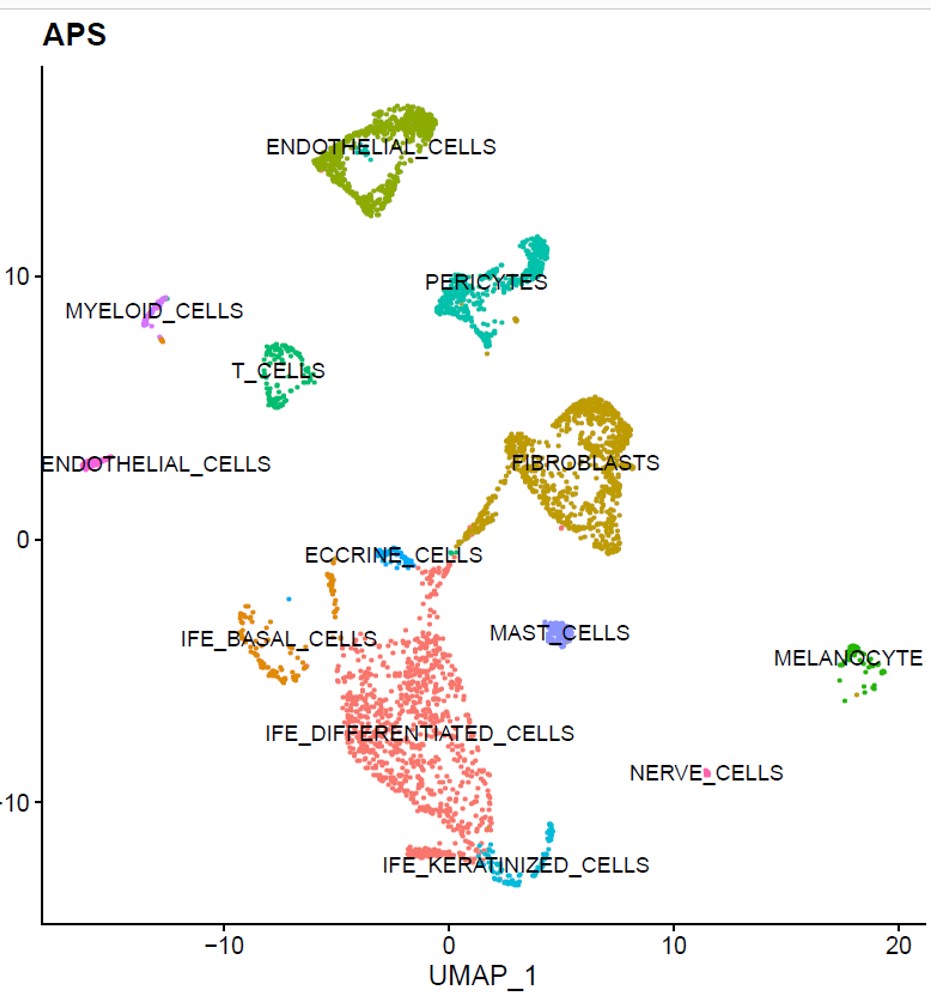Session Information
Session Type: Abstract Session
Session Time: 4:00PM-4:50PM
Background/Purpose: Antiphospholipid syndrome (APS) is a thromboinflammatory disease that can present with a variety of clinical phenotypes. Livedo reticularis is the most common skin manifestation of APS, representing a netlike pattern of reddish-blue skin discoloration indicative of superficial vessels that have swollen in response to sluggish flow in the deeper vascular network. Interestingly, livedo reticularis is predictive of APS patients at higher risk of cerebrovascular events. Although the interaction between antiphospholipid antibodies (aPL) and endothelial cells are likely key mechanistic drivers of livedo reticularis, these cells have rarely been directly studied. Here, we used single-cell RNA sequencing to begin to characterize APS endothelial cells.
Methods: We applied single-cell RNA sequencing to skin biopsies of two APS patients with livedo reticularis and three matched controls with neither APS nor livedo; t-distributed stochastic neighbor embedding (t-SNE) was then used to identify the various cell types. We performed GO and pathway enrichment by using Database for Annotation, Visualization, and Integrated Discovery (DAVID) analysis.
Results: By combining the t-SNE analysis with the expression of known endothelial cell markers, we identified three subpopulations of endothelial cells among the sorted cells (Figure 1). Subsequently, we compared expression profiles between endothelial cells from healthy and APS skin and found significant upregulation of CD36 (a scavenger receptor) and TXNIP (a mediator of oxidative stress) in APS endothelial cells. Using DAVID analysis, we revealed that the APS endothelial cell expression profile is enriched for processes associated with cell adhesion, angiogenesis, and type I interferon signaling.
Conclusion: To our knowledge, this is the first direct analysis of gene expression in APS endothelial cells. These data suggest that APS endothelial cells from skin affected by livedo reticularis demonstrate a pattern of gene expression associated with endothelial activation and damage. We are actively recruiting additional patients into the study in pursuit of providing a foundation for future studies of vascular injury in APS.
 Figure 1 t-SNE analysis of the cells isolated from the antiphospholipid syndrome (APS) skin with livedo reticularis. Defined number of 13 clusters with every cluster represented by a different color.
Figure 1 t-SNE analysis of the cells isolated from the antiphospholipid syndrome (APS) skin with livedo reticularis. Defined number of 13 clusters with every cluster represented by a different color.
To cite this abstract in AMA style:
Shi H, Billi A, Wasikowski R, Gockman K, Tsoi A, Gudjonsson J, Knight J. Single-cell RNA Sequencing of Livedo Reticularis Skin Reveals Endothelial Pathology in Antiphospholipid Syndrome [abstract]. Arthritis Rheumatol. 2020; 72 (suppl 10). https://acrabstracts.org/abstract/single-cell-rna-sequencing-of-livedo-reticularis-skin-reveals-endothelial-pathology-in-antiphospholipid-syndrome/. Accessed .« Back to ACR Convergence 2020
ACR Meeting Abstracts - https://acrabstracts.org/abstract/single-cell-rna-sequencing-of-livedo-reticularis-skin-reveals-endothelial-pathology-in-antiphospholipid-syndrome/
